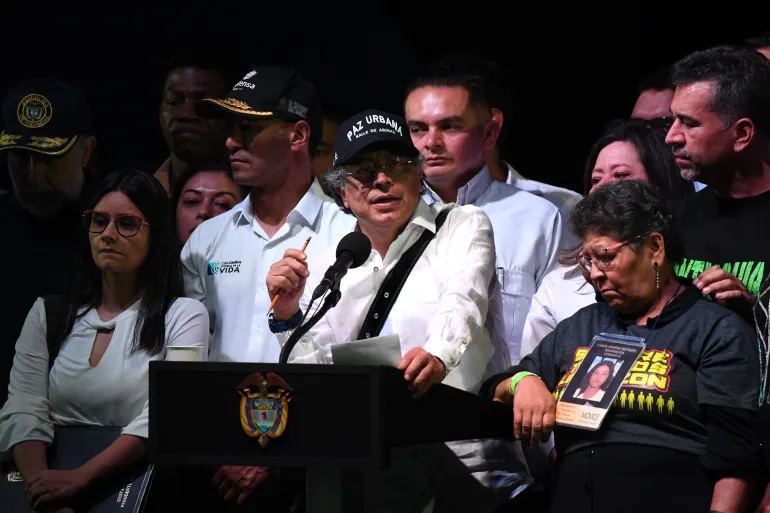A tense and rapidly escalating crisis is unfolding in southwest Colombia, where more than 50 soldiers have been captured by civilians in a region long plagued by violence, drug trafficking, and rebel activity.
The Colombian army confirmed on Sunday, June 23, 2025, that 57 of its troops, including four noncommissioned officers, are currently being held against their will.
Local media reports that the soldiers are held in the mountainous area of Micay Canyon, a region notorious for its strategic role in cocaine production and as a stronghold for armed dissidents.
The soldiers were initially deployed as part of a military operation in the municipality of El Tambo, Cauca, on Saturday.
While conducting the mission, a platoon was surrounded and detained by local residents.
A day later, as another group of soldiers moved toward the town of El Plateado in the same region, they too were encircled, this time by approximately 200 civilians, and prevented from advancing.
The army has classified the incident as a “kidnapping,” not by spontaneous civilian action, but by communities reportedly under the influence of the Central General Staff (EMC).
The EMC is reportedly the largest faction of FARC dissidents who refused to participate in the landmark 2016 peace agreement.
General Federico Alberto Mejía, stated in a video address that the actions were orchestrated by “rebel infiltrators” embedded within the local population.
General Mejia is the commander in charge of operations in Colombia’s southwest.
“Fifty-seven of our professional soldiers, including four noncommissioned officers, remain illegally detained.
This is a serious violation not just of military protocol, but of human rights and the rule of law,” Mejía said.
President Gustavo Petro, who has made peacebuilding a central pillar of his administration, took to social media on Sunday to demand the immediate release of the troops.
“Freeing the soldiers is imperative,” he posted, signaling that the incident could jeopardize his broader peace initiatives.
Petro has long viewed the Micay Canyon as a critical region to reclaim, not only because of its central role in cocaine production but also because it has become a battleground for competing armed groups.
Since the demobilization of FARC fighters under the 2016 peace deal, a patchwork of rebel factions and organized crime networks has fought to fill the power vacuum in rural areas.
The EMC, formed by ex-FARC commanders who rejected the peace agreement, has been especially active in Cauca and other coca-producing regions.
The group has exploited poor infrastructure, weak state presence, and social discontent to expand its influence.
In recent years, the region has become increasingly dangerous—not just for the military, but also for civilians, particularly Indigenous communities.
Peace talks between the EMC and the government collapsed last year after a string of violent attacks targeting Indigenous leaders and civilians.
Many Colombians now fear a slide back into the turbulent era of the 1980s and 1990s, when narco-trafficking cartels, guerrilla groups, and paramilitaries unleashed chaos across the country.
The government has faced growing criticism over its inability to bring stability to rural areas despite efforts to negotiate with multiple armed factions.
In cities and towns across the country, the public has voiced increasing concern over the deterioration of security and the lack of progress in peace efforts.
While the captured soldiers have reportedly not been harmed so far, their detention highlights the fragile and volatile nature of state control in many regions of Colombia.
The army has called for calm but remains on high alert as discussions are reportedly underway to secure the safe release of the troops.
“This incident is not just a military matter, it’s a test of our national sovereignty and the strength of our democratic institutions,” said a senior Colombian defense official, speaking anonymously due to the sensitivity of the situation.
As Colombia grapples with the realities of post-conflict transition, the events in Micay Canyon serve as a stark reminder that the path to lasting peace remains deeply complicated.
Observers believe the coming days will be critical—not only for the fate of the detained soldiers, but for the credibility of the government’s broader peace strategy.



